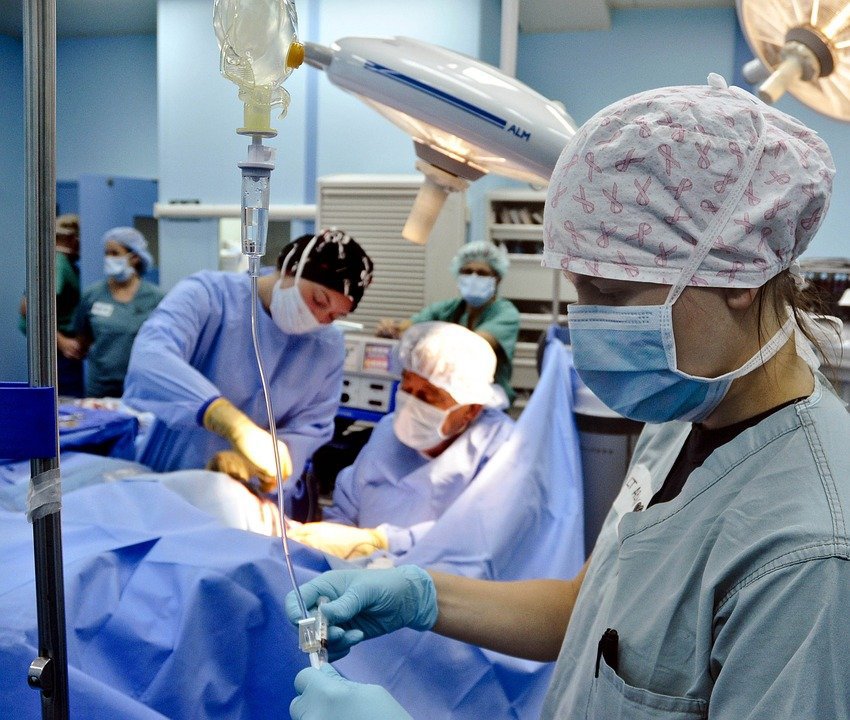Guide to Non-Clinical and Non-Bedside Nursing Jobs: Over 30 Alternative Career Paths for Nurses & How to Access Them

Alternative Nursing Careers Beyond Bedside Care: What Jobs Can You Do if You Don’t Want to Work with Patients Anymore
The exciting thing about a career in nursing is that it provides a vast variety of roles and career options, which means that you’ll never get bored working in this rewarding field.
However, if the long hours have taken their toll or if you want a change of pace and a shift in responsibilities, you might decide that the best option for you is leaving the bedside or the clinical environment and pursuing a different direction in your career.
Luckily for you, nursing is one of the few fields that offers a plethora of options, equally meaningful, whether in a hospital or non-hospital setting.

Why Consider Alternative, Non-Clinical, and Non-Bedside Nursing Jobs?
The nursing workforce is assuming increasingly diverse roles, ranging from traditional patient care to research, education, forensic science, informatics, and nutrition. Career paths for nurses are more diversified than ever. Nurses who decide to change their careers often cite burnout, 12-hour shifts, and workplace incivility as the primary challenges they face in their current workplace. So, should a nurse decide they want a job that offers more stability and flexibility, then changing the setting is now more achievable than ever.
Alternative, non-bedside nursing jobs come with several benefits for professionals, including:
- More predictable schedules, with fewer night shifts, 9-to-5 work schedules, and less hectic or urgent tasks in the workplace.
- Less physical strain, fewer health hazard concerns, and a lower risk of burnout.
- Opportunities to focus on specialties like research, consultancy, advocacy, technology, or education.
- Ability to impact healthcare on a broader scale by using your nursing knowledge in new settings.
- Meaningful work to the improvement of patient outcomes or supporting the nursing profession.
- Remote work and work-from-home opportunities with reduced or no patient contact, including telehealth nursing, case management, or legal consultancy jobs.

How to Transition from Bedside to Non-Bedside Nursing Jobs?
If you are preparing to reorient your career and consider working in non-clinical or non-bedside nursing jobs, there are a few steps to take to become an eligible candidate.
1. Achieve the Appropriate Level of Education
There are two ways to change your nursing career and advance towards a non-bedside nursing job that still gives you plenty of satisfaction in using your nursing background – by getting a Bachelor of Science in Nursing (BSN) or a Master of Science in Nursing (MSN).
Compared to nurses who haven’t pursued either undergraduate or graduate programs, you’ll be able to take on more responsibility as a result of the advanced training you have received, such as:
- More complex decision-making skills
- Supervising other nurses and coordinating departments
- Developing nursing care treatment plans
- Educating patients and communities
Advancing your education to the graduate level also involves choosing an academic path that prepares you for the career option you desire. You should know what Master’s in Nursing programs you can enroll in and what each one offers.
If you want to advance your career by achieving a higher level of education, you can enroll in one of the academic programs available at Nightingale College – hybrid or entirely online options that enable you to further your education while also attending to your current professional and personal responsibilities. Here are some options to consider:
- BSN Program – A hybrid learning option that combines online instruction with supervised on-ground field experiences completed in one of our SOFE areas, and that can be completed in under 3 years.
- RN-to-BSN Track – A 1-year fully online learning path recommended for working registered nurses who want to achieve the highest level of accreditation in their field.
- MSN Ed – Graduate program developed to prepare you for non-clinical roles in nursing education.
- MSN FNP – Graduate program that provides the training for family and community health roles, including family nursing practice or community healthcare.
- MSN PMHNP – Graduate program recommended if you want to work in the field of mental health and psychiatry.
2. Obtain Clinical Experience
Although your bedside work and patient contact will diminish considerably once you transition to non-bedside nursing jobs, you still require some level of clinical experience before changing your career.
Nursing careers that do not involve bedside care, such as school nursing or public health nursing, make up a significant portion of the medical field. Additionally, it’s easy to transition from a clinical to a non-clinical career, as most roles require several years of experience in a healthcare environment.
Bear in mind that advanced positions and leadership roles often require nurses to have several years of clinical experience before transitioning to an office-based role. Therefore, these roles are more suitable for a career change from a BSN rather than as graduate jobs.
3. Get the Necessary or Recommended Certifications and Training
Even when your prospective employer or job does not expressly require them, some training modules and certifications ease the transition process and allow you to access more professional avenues. These include Certified Case Manager (CCM), Certified Informatics Nurse (CIN), and Legal Nurse Consultant (LNC) certifications.
4. Look for Advancement Opportunities
One sure way to access alternative nursing jobs is by taking advantage of the nursing career ladder and exploring available advancement opportunities. Although they primarily concern furthering your education and aiming to achieve certifications to broaden your scope of practice, advancement opportunities can also include seeking mentorship from more experienced professionals or faculty, joining professional nursing organizations, networking, and attending workshops and conferences.
5. Continue Improving Your Skills and Education
Even when you access your desired non-clinical nursing role, continuing education is a requirement, particularly in a field that supposes constant development and adaptation to evolving standards and practices. Continuing education for nurses is not only crucial for maintaining a high level of expertise and professionalism, but also represents a requirement for maintaining your certification status and eligibility for various roles, particularly in education, research, and advocacy.
Where Can You Find Nursing Jobs Away From the Bedside?
Here are some places to look for alternative nursing careers, along with the non-bedside nursing jobs you may find yourself taking:
- Physician offices, if you’re looking for an administrative role with limited patient care responsibilities
- Research laboratories, if you want to study diseases, test new medicines, and work closely with scientists, physicians, and patients
- Nursing care facilities, hospitals, and clinics with open administrative and managerial positions
- Pharmaceutical companies, if you are looking for patient education or sales rep roles
- Private and public education institutions, if you want to become a nurse educator
- State, public, and government institutions, if you’re looking for public health roles, such as a School Nurse, where you work to educate entire communities
- Insurance and law firms, if you want to specialize in medical laws and assist in legal claims related to malpractice, accidents, and workers’ compensation
- Private companies, for occupational nursing roles
You don’t have to stop working in a clinical care facility altogether. Even if you want to leave bedside care, there are many administrative and managerial positions that you can take up!
Here are the main categories of nursing jobs that are not bedside or that involve little to no clinical practice and patient contact:

Non-Bedside Nursing Jobs in Administration and Leadership
These roles include nurses utilizing managerial, organizational, and leadership skills, often in office settings.
1. Nurse Manager or Administrator
Nurse Administrators don’t need a Master’s degree; however, a Bachelor’s degree in Health Administration can put you at an advantage compared to other candidates with BSN degrees. This more leadership-oriented career entails the nurse being responsible for the operations of an entire unit, including budgeting, planning, and managing human resources. Being a management role, you would take on more administrative duties, which come hand in hand with a greater deal of responsibility.
2. Nurse Case Manager (NCM)
A nurse case manager is an RN who specializes in coordinating long-term care plans for patients with chronic illnesses, complex medical conditions, or special needs. They work as patient advocates and care facilitators, ensuring individuals get comprehensive, high-quality care across various services and providers. They are typically responsible for developing personalized care plans, arranging services (such as therapies or home care), monitoring progress, and adjusting plans as necessary to achieve optimal outcomes. Since NCMs bridge gaps between patients, doctors, insurance, and community resources, their role extends beyond bedside care and often involves little to no direct clinical practice.
3. Director of Nursing (DON)
The primary responsibility of nursing directors will be to promote the success of their organization by integrating the latest technology and research into treatment, thereby providing patients with the best possible care. Job duties include creating treatment plans, evaluating patients’ treatment results, and coordinating the medical team.
4. Chief Nursing Officer (CNO)
The highest-ranking nurse administrator role in a healthcare organization, an officer does chief nursing officers do not provide direct patient care but instead oversees all nursing personnel and the delivery of nursing services within the facility. CNOs are responsible for maintaining high patient care standards and achieving quality outcomes by supervising nurse managers and DONs, developing and implementing nursing policies, ensuring the nursing department meets regulatory requirements, and also providing the big picture in strategic planning.
5. Nurse Navigator
Nurse navigators specialize in guiding patients through complex healthcare processes, typically after a serious diagnosis like cancer, serving as a single point of contact that helps patients understand their diagnosis and treatment options, coordinating appointments and resources from initial diagnosis through treatment and into survivorship. This role is often present in the field of oncology nursing, but differs from other registered nurses in the extent to which it participates in clinical practice.
Read more about the leadership and management positions in the field of nursing.

Non-Clinical Jobs in Nursing Education and Training
These roles focus on teaching and training the next generation of nursing professionals, ensuring the continuity of the profession and industry.
6. Nurse Educator (NE)
Nurse educators are the backbone in the process of preparing the next generation of nurses, reducing the ongoing staff shortage, and ensuring continuity in the field. Although their primary role is to educate learners in matters of direct care and core nursing concepts, NEs are also responsible for evaluating, mentoring, and ensuring academic standards, primarily through the development of teaching and learning plans and procedures.
Learn about the estimated nurse educator salaries in the US.
If you want to start your journey in nursing education, Nightingale College offers the MSN Ed Program, which trains confident, competent, and compassionate future nurse educators.
Find out more about how to become a nurse educator.
Enroll today in the MSN Ed Program and help shape the future of the nursing profession!
7. Clinical Staff Development Educator
Clinical or staff development educators are experienced nursing professionals dedicated to improving the skills and knowledge of the staff within a healthcare facility. Their responsibilities are subject to change depending on the requirements of each unit, but often range from orienting and training new nurses and developing continuing education programs to leading quality improvement initiatives and updating clinical policies.
8. Clinical Instructor
Clinical instructors are a type of nurse educator who teach nursing learners in the clinical environment rather than in classrooms or academic facilities. Clinical instructors supervise and mentor students during clinical rotations and field experiences. Their responsibilities include demonstrating proper techniques and ensuring patient safety as learners practice hands-on skills. Similar to nurse educators, they draw on their own clinical experience to bridge the gap between theory and practice for aspiring nurses.
Find out more about the differences between teaching and nursing.
9. Nurse Researcher
If a more academic and science-oriented career sounds more appealing to you, then becoming a nurse researcher might be the way to go. Nursing researchers are typically involved in designing and implementing scientific studies aimed at improving the quality of healthcare services. Furthermore, part of the job might include working with other researchers and scientists to address issues from pharmacy, nutrition, medicine, or engineering.
10. Academic Nurse Writer
An academic nurse writer is a professional who leverages their clinical background in a writing or publishing career. This role may involve writing textbooks, journal articles, continuing education materials, healthcare blogs, and other content that disseminates nursing and medical knowledge.
Despite its utility for developing the field of nursing and clinical knowledge, freelance academic writing is one of the most appealing remote nursing jobs.

Public Health and Community Non-Bedside Nursing Jobs
Although not entirely separated from bedside care and clinical practice, public health, community, and home health nursing offer multiple career paths that allow for relative independence from traditional clinical environments.
11. Public Health Nurse
What sets public health nurses apart is that they care for communities, rather than just individual patients. They are responsible for implementing health programs, promoting well-being, and educating entire populations regarding diseases, treatments, and other health-related topics. Working settings for public health nurses can be varied – from schools to non-profit agencies, or from government agencies to hospitals.
12. Family Nurse Practitioner
Family nurse practitioners deliver comprehensive care and guidance to individuals and families across the lifespan, with academic programs in family care that showcase a focus on community health and comprehensive preparation for diverse scenarios. FNPs can find employment in outpatient clinics, family practices, and underserved areas.
If you are interested in improving the lives of patients, families, and the community as a whole, you can achieve the necessary education by enrolling in the CCNE-accredited MSN FNP Program at Nightingale College – a hybrid learning option that combines online instruction with in-person seminars and preceptorship experiences, which can be completed in just 2 years.
Enroll in the MSN FNP Program at Nightingale College and achieve your desired career!
13. School Nurse or Summer Camp Nurse
School nurses work in educational settings, such as schools or colleges, to provide healthcare services for students and academic staff. They handle daily needs, including first aid for injuries, administering medications to students, managing chronic conditions, such as asthma and diabetes, and ensuring immunization compliance. Summer camp nurses play a similar role in camp environments, caring for campers who become ill or injured, from treating scrapes and sprains to coordinating emergency care as needed.
These career options are some of the least stressful nursing jobs you can access, involving limited primary care and clinical practice.
14. Occupational Health Nurse
Occupational health nurses play a crucial role in workplace safety, as they oversee business settings and develop health and safety programs for businesses, while also educating employees on maintaining healthier lifestyles and preventing job-related injuries. Another essential part of their job is monitoring workers who have been injured on the job, assisting with their rehabilitation, and providing emergency care to employees who are injured while on the clock. Thus, even though the role may involve a certain degree of clinical practice, it is primarily a non-bedside nursing job.
15. Hospice or Palliative Care Nurse
Hospice nurses – healthcare professionals who primarily work with terminally ill patients – help provide medical attention and end-of-life care in home settings. Their role requires them to be well-versed in meeting patients' medical needs and to be experts at providing emotional support to both patients and their families. Obtaining certification as a Hospice Palliative Nurse enhances the chances of employment in the field.
16. Home Health Nurse
Home health nurses provide high-quality, expert nursing care to patients in their homes, primarily to those who undergo surgery or other medical procedures and may require additional care even after being discharged from the medical facility. These procedures can be provided through regular home health nurse visits. Patients recovering from accidents or injuries may also require in-home specialized nursing care.

Healthcare Informatics and Technology Non-Clinical Nursing Jobs
Technological advancements have also impacted nursing practices and standards, opening new avenues for non-bedside nursing jobs that combine information technology with clinical knowledge.
17. Informatics Nurse
Nursing informatics enables professionals to integrate their passion for technology with nursing practice, thereby enhancing the delivery of healthcare. The primary responsibilities of an informatics nurse include preparing systems, providing training, and offering user support. You may work directly with vendors and technical experts to optimize the clinical design, meeting the needs of various end-users, including doctors, nurses, pharmacists, lab staff, and administrative staff.
18. Clinical Analyst
Clinical analysts are IT-focused healthcare professionals with a nursing background who optimize healthcare information systems and data. The role combines healthcare expertise with IT skills to enhance EHR systems and improve clinical software performance. They provide a bridge between the activities of frontline healthcare practitioners and the tech-related solutions and processes relevant to healthcare.
19. Telehealth Nurse
Telehealth nurses provide nursing care, advice, and guidance remotely, generally using telephone, video calls, or online messaging instead of in-person visits. Their roles include performing triage over the phone and educating callers on home care or next steps, often working in synergy with clinical practitioners and home care nurses. Telehealth nursing aims to improve communication between healthcare providers and patients and increase accessibility around the clock, while also unclogging the stream of healthcare provision by reducing unnecessary ER trips.
20. Nurse Data Analyst
A nurse data analyst is a role that combines nursing knowledge with data science skills to facilitate the analysis of healthcare data, thereby improving outcomes and operations. The role involves collecting, interpreting, and analyzing medical data, including patient outcome reports, infection rates, and utilization metrics, to identify trends, inefficiencies, and areas for improvement. Nurse data analysts are similar in many ways to clinical analysts and often collaborate with them to improve patient outcomes and minimize adverse effects on patients and healthcare practitioners. However, data analysts represent a role that is more focused on data analysis, having a more reduced scope but also a more specialized area of expertise.
21. Hospital Quality Coordinator
Hospital quality coordinators are often RNs in quality improvement or assurance roles, focusing on maintaining and enhancing the standards of patient care in a healthcare facility. For example, an RN quality improvement coordinator’s responsibilities include reviewing clinical processes, auditing patient care outcomes, and ensuring that nurses and staff adhere to established care protocols and regulations.
They gather and analyze data on quality indicators like infection rates or patient satisfaction scores, identify areas where the hospital’s performance could be better, and help implement strategies to achieve those improvements
22. Telemetry Nurse
Telemetry nurses are high-tech EKG/ECG equipment experts who specialize in monitoring and cardiac conditions and vital signs of patients who have experienced events such as heart attacks, undergone cardiac surgery, or have cardiac conditions, such as arrhythmia. They typically work in hospital telemetry units. Depending on the work setting requirements, telemetry nurses may also perform standard nursing care, including medication administration and care plan updates; however, their primary focus is tracking patient health in real-time using their advanced knowledge of cardiac care technology.

Legal, Consulting, and Corporate Non-Patient Care Nursing Jobs
Nurses and professionals with a nursing background can work outside of the clinical field altogether, particularly by pursuing non-clinical and non-bedside roles in consulting, legal counselling, recruiting, and corporate positions.
24. Legal Nurse Consultant (LNC)
Legal nurse consultants evaluate health care and medical insurance claims, conduct medical research, and use their knowledge of both the legal and nursing fields to make recommendations and select medical expert witnesses. LNCs assist attorneys throughout the litigation process, bringing their clinical experience and thorough medical expertise to the table.
25. Insurance Claim Nurse
One of the highest-paid remote nursing jobs in the industry, an insurance claim nurse works with insurance companies to review medical insurance claims for accuracy and appropriateness. The nursing background and clinical experience help them understand the treatments or services billed and determine whether those are covered under the patient’s insurance plan.
26. Healthcare Recruiter
A healthcare recruiter specializes in hiring medical staff, particularly nurses, for healthcare facilities. Recruiters in the nursing field often require clinical experience and a nursing background, as these can help identify candidates with the right qualifications and skills for specific work settings. Although candidates require expertise, the role of a healthcare or nursing recruiter does not require performing any form of frontline or primary care processes.
27. Nurse Ethicist
This field is gaining increasing attention as ethical issues in the medical field are numerous, and addressing them properly is imperative. From tackling challenging decisions, such as informed consent and quality of life, to having tough conversations with patients or family members, nurse ethicists are becoming increasingly important to the healthcare system.

Other Non-Traditional and Non-Clinical Nursing Jobs
Once you join the nursing workforce, you may also access other exciting and unique non-bedside nursing jobs that offer travel, practice in non-standard or non-clinical environments, and even adventure. Here are some of the roles you may consider:
28. Flight Nurse
Working as part of air medical transport teams, flight nurses provide critical care to patients during flights to a hospital. They are also known as transport nurses or life-flight nurses and handle medical emergencies in non-traditional settings – inside a helicopter or fixed-wing aircraft thousands of feet in the air. Flight nurses are highly trained in trauma care and advanced life support, because the patients they transport are often in very grave conditions.
29. Nutritionist Nurse
Nutritionist nurses work in either acute or primary care, assessing patients' diets and providing tailored advice based on their specific medical needs. Other responsibilities may include creating wellness programs for athletes or organizations, assisting individuals in maintaining or losing weight, and developing customized meal plans. Nutritionist nurses can work in schools, clinics, nursing homes, or be associated with various organizations.
30. Travel Nurse
Travel nurses are nursing professionals who provide quality care for patients in various work settings by commuting and working at different facilities, depending on local shortages or particular unit requirements. Travel RNs often specialize in areas such as ER nursing, ICU care, labor and delivery, or midwifery. Thus, they fill in roles that are required in various contexts and that cannot be fulfilled by the nursing pool in the facility.
Travel nursing jobs can offer a rousing work experience, and sometimes a higher salary, although they come with uncertainties regarding income stability. However, if you choose one of the highest-paying travel nursing jobs, you can make up for the downsides.
You should also learn more about the travel nurse salaries across the US.
31. Military Registered Nurse
Military nurses are RNs who serve as commissioned officers in the armed forces, delivering nursing care within the military health system and military contexts. They usually fulfill similar duties to civilian nurses, but may also be deployed to combat zones and stationed at military hospitals and clinics worldwide. Their work environment is often fast-paced, high-stress, and occasionally dangerous, as military RNs might work in makeshift facilities under fire or in disaster zones as part of humanitarian missions, while also being required to handle unique challenges, such as treating battlefield trauma, dealing with infectious conditions, managing healthcare ligistics, all in austere conditions and remote locations.

10 Highest-Paying Non-Clinical Nursing Jobs
When transitioning from clinical or bedside to non-clinical or non-bedside nursing jobs, one of the primary concerns you may have is related to your earning potential and income stability.
Luckily, many nursing jobs that are not bedside also have high earning potential and estimated yearly salaries. Here are the 10 highest-paying non-clinical nursing jobs:
- Chief nursing officer (CNO) – $244,890 per year[1]
- Director of nursing (DON) – $244,090 per year[2]
- Healthcare quality management director – $161,758 per year[3]
- Informatics nurse/manager – $134,219[5]
- Director of infection prevention – $119,113 per year[4]
- Nurse administrator / medical & health services manager – $117,960[6]
- Nurse ethicist – $87,721[7]
- Nurse educator – $87,090[8]
- Legal nurse consultant – $87,681[9]
- Nurse case manager – $83,501[10]

Are You Ready to Advance to Your Chosen Non-Bedside Nursing Job?
Nursing is one of the most exciting professions, thanks to the wide range of career options available to you. If you feel it’s time to make a change, be sure to take advantage of the opportunities available with the appropriate degree.
- If you want to qualify for remote, non-clinical, or non-bedside nursing jobs and have no prior nursing experience, enroll in our BSN Program, a focused educational option that prepares you for nursing roles and can be completed in just 3 years.
- If you are an RN ready to take a leap and become a BSN nurse, you can opt for the RN-to-BSN Track – a 1-year 100% online learning path that lets you advance to the highest level of education in your field.
- For advancing your education to the graduate level, you can choose from three different CCNE-accredited 2-year learning options with different focuses: MSN Ed, for educational and academic careers, MSN FNP, for family, community, or public health care jobs, or MSN PMHNP for jobs related to psychiatry and mental health.
Does the idea of shaping tomorrow’s generation of nurses sound enticing to you?
Enroll in our academic programs and achieve your career goals!

